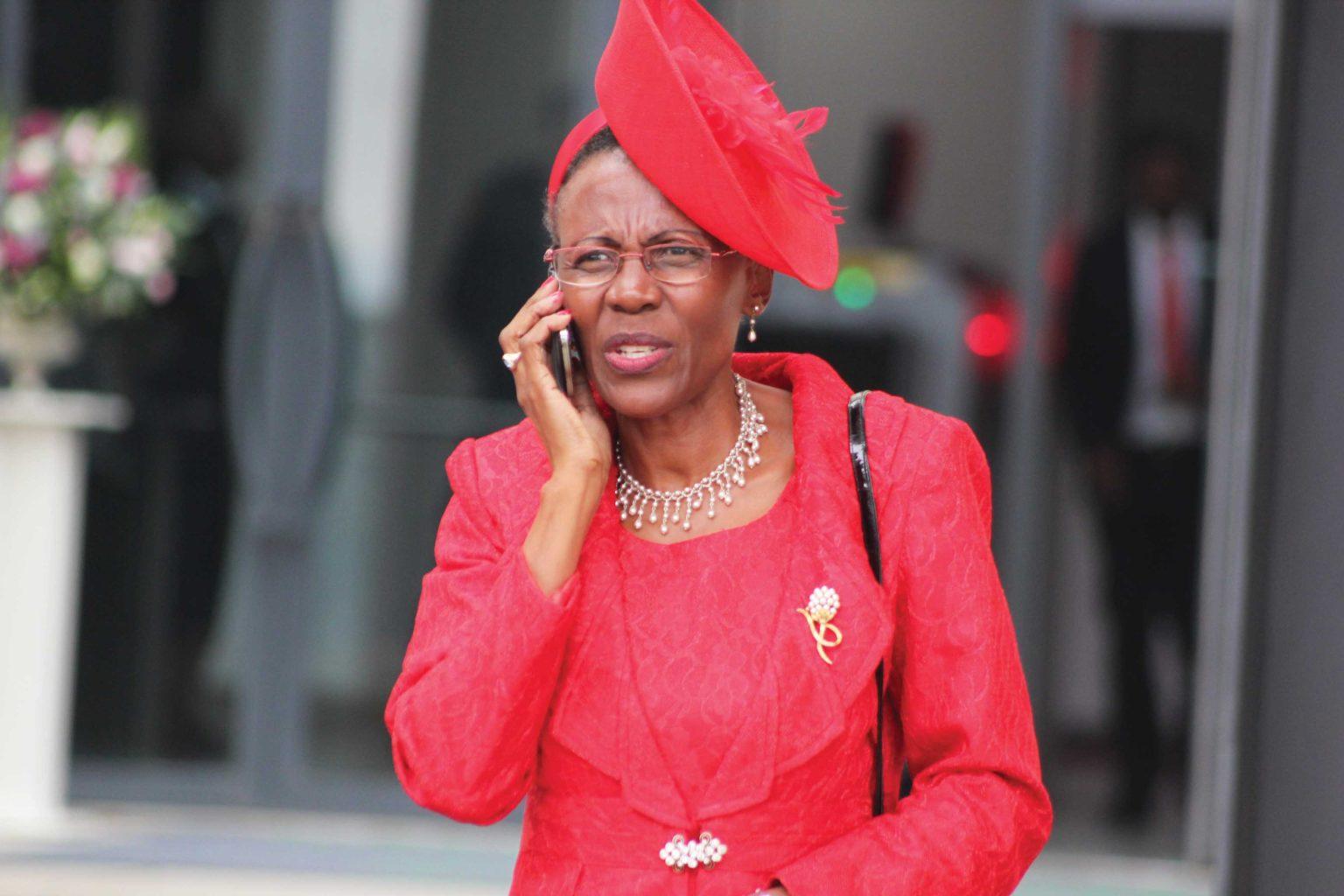Africa-Press – Lesotho. DR ‘Mamphono Khaketla was sifting through some documents when her secretary came into the office. She handed Khaketla, who was the minister of finance, a paper that would disrupt her life in more ways than one.
It was early November 2016. It was a letter from the Directorate of Corruption and Economic Offences (DCEO) inviting Khaketla for questioning. She was not entirely shocked.
She had seen the hurricane coming a few weeks earlier when a director of one of the companies vying for the government’s fleet management contract alleged that she had demanded a M4 million bribe.
It was a spectacular revelation, coming with all the gory details of how Khaketla had used someone to solicit the bribe on her behalf so she could have plausible deniability if there was a backlash.
That someone was Thabo Napo, a former soldier, who was allegedly close to Khaketla. The bribe, said the Lebeonyana Fleet Solutions director, had been demanded at her house.
He however didn’t say who had instigated the meeting but said it happened in March 2017 and that it was Napo who did most of the talking. As social media, newspapers and radio stations buzzed with the salacious allegations, Khaketla braced herself.
Political opponents seized on the claims to demand her resignation. At 10am on November 6, 2016, Khaketla walked into the DCEO’s office and was ushered into a room with four investigators.
The three men led the interrogation while the woman, who did not ask a single question, seemed to have been invited to only observe. When the interrogation started the line of questions told her that they were getting ready to charge her.
The interrogation lasted until 3pm. In those five hours every detail of her life was turned inside out as the officers probed for answers. Her bank statement was placed on the table.
“How much money do you make,” one officer asked.
“You can see it’s only my salary that comes in there,” she replied.
“And how about those other amounts,” another probed.
“When you see other amounts it’s the per diems because I would have travelled,” she said, amused that they had managed to access her bank records but still wanted her to explain it in detail.
They then turned to an email that Khaketla thought had nothing to do with their investigation. “Why do you send an email at 2am?” asked another officer, referring to an email she had sent to a senior officer in her ministry months earlier.
She explained that she might have sent the message when she was in another time zone on official business. “In any case why does it matter who and when I send an email,” she quipped, now exhausted and irritated by the back and forth.
The investigators were also keen on details about her foreign trips, all of which were official and unrelated to the investigation of the tender. They asked why she had cancelled the tender process in June that year.
She explained that there were some gross irregularities and the decision had been made by a sub-committee that included the Minister of Transport, Law, local government and public service.
One of the officers announced that she was being charged with corruption and abuse of office. He said they would take her to the police headquarters across the road for a mugshot and fingerprints.
She refused, arguing that she felt unsafe going to the police because they were notorious for torturing suspects. They relented and a policeman came to the DCEO offices instead.
Chin up. Flash. Turn to the right. Flash. To the left. Flash. The ink pad was brought in for her fingerprints. “I felt humiliated. They were treating me like a criminal and I could sense they were deriving some pleasure from the whole process,” Khaketla says.
She would however wait for another seven months for the DCEO to bring the case to court. The appearance, in June 2017, was a spectacle that the media were milking for sound bites, pictures and colour.
Such events are fodder for the media. Here was a minister of finance accused of demanding a bribe. The international media picked up the story. Local radio stations were blazing as callers, egged on by audibly excited presenters, took turns to brand her a thief.
She pled not guilty and bail was set at M5 000. The condition was that she was supposed to report to the police every Friday before 5pm. Thabo Napo, her co-accused, had the same conditions.
Khaketla was now officially a guest of the country’s painfully slow legal system. And for the next five years, it lived up to its well-earned notoriety.
The prosecution imported a prosecutor from South Africa, Advocate Hjalamr Woker. And as if following some sacrosanct rule book the prosecution started playing the postponement game.
Khaketla was bleeding cash in legal costs with each appearance and delay. She was fighting with a state that had no limited resources with her ministerial salary.
The prosecution continued to request postponements. It was either its lawyer was not available or witnesses could not be found. It was a war of attrition and it left her out of pocket.
Her money woes would worsen a few weeks later when the government fell and she lost her job. Three years later Advocate Woker withdrew from the case saying he was too afraid to travel to Lesotho because of the Covid-19 pandemic.
The DCEO also pulled out of the case after one of their witnesses died and the other two became hostile. That should have been the end of the case but the DPP insisted on pursuing the case with its own prosecutor.
On one occasion the new lawyer appeared in court without a robe and the judge promptly threw him out. He was there to ask for another postponement on claims that he had just been briefed about the case.
He got his wish and Khaketla’s bill went up by a few thousands. Khaketla and her legal team had long been drained of their last ounce of patience. Early this year her lawyer applied for a discharge arguing that the prosecution was not ready to proceed with the case.
Curiously, the DPP, which has clamoured for the case when the DCEO pulled out, did not oppose the application for discharge. Perhaps they had taken the case and Khaketla as far as they could go and it was time to let go.
Last Friday, Justice Makara granted the discharge but had stern words for the prosecution which she chastised for stringing Khaketla. Khaketla walked out of the court a free woman but she is badly bruised.
During that five-year ordeal, she could not apply for a job or visa. She failed to accompany her daughter to the United Kingdom where she had enrolled. When she graduated two years later, Khaketla was still unable to apply for a visa because of the court case.
Meanwhile, she could only salivate at the jobs that were within her qualifications and experience but she could not apply with the case hanging over her head.
“They have stolen five years of my life. A whole five years,” Khaketla says, adding that people refer to her as ‘Khaketla of Bidvest’.
“They damaged me when I was 57, the prime age at which I was likely to be appointed to some senior position at international organisations.
No one could touch me despite that I was qualified. ” Her applications were acknowledged but there were no follow-ups. She believes there was a political hand at play.
“I believe one senior Congress politician who is now heading an opposition party and was in the government with me, was behind this sting operation on me.
He did a job on me. ” Khaketla can now rebuild her life and career but she accepts that it will be a monumental task. The internet still records her as a former minister facing corruption charges.
“In July 2016, Khaketla was accused of soliciting a bribe for a major government contract in a case that was before the courts.
She denied the allegation,” says Wikipedia. “Lesotho’s great car ‘con’,” says new24. com. By last night there was no entry on her acquittal. The media that was there when she first appeared in court in 2017 was not there.
“I would have wanted my day in court so that I could prove my innocence.
But I have to apply for discharge because this was clearly a sham trial instigated by political enemies,” she says. “I will take what the court has given me and try to mend my life.
It hurts but that is Lesotho’s politics and justice system for you. ” “Your name is dragged in the mud and you suffer the consequences without much recourse. This is the trend and it has to stop. ” She now has to pick up the pieces without the media’s help to spread the message of her acquittal.
For More News And Analysis About Lesotho Follow Africa-Press






